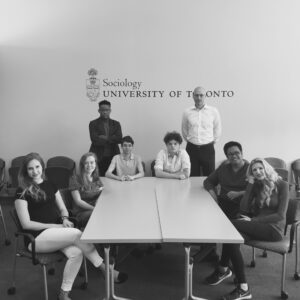
This summer, we are excited to be joined by 6 promising undergraduate students: Sarah Lima, Bastian Leones, Melissa Nicholls, Siobhan O’Connell, Mercer Pommer and Joshua Rodriguez. Over the next three months, the students will contribute their research expertise to the Gender, Migration, and Care project and have the opportunity to be trained and mentored by CGSP staff and researchers.
We asked the students to tell us about their educational backgrounds, their interest in the Gender, Migration and Care project, and what they are looking forward to this summer.
What are you studying?
Sarah: I’m studying Diaspora and Transnational studies and European studies. In Diaspora and Transnational studies, we examine the intersections of gender, migration and care through various nationalistic templates in comparative analysis (both legally and socio-economically).
Bastian: I am in my fourth-year and currently pursuing a double major in Sociology and Neuroscience.
Melissa: I’m an Equity Studies Major, with a double minor in Indigenous Studies and Creative expression in Society.
Siobhan: I just finished my second year at McGill University, studying Sociology with a minor in Mathematics. Within sociology, I am particularly interested in gender, feminist theory, criminology and the social construction of deviance.
Mercer: I’m doing a double major in Political Science and Philosophy with a minor in East Asian Studies.
Joshua: I am a fourth-year undergraduate student studying Public Policy, with two minors in Political Science and Psychology.
What interested you about the Gender, Migration, and Care project?
Bastian: My involvement in community-based organizing led me to understand that the pathway of Filipino Canadian immigrants are inextricably linked to the Canadian Caregiver Program. Being a recent immigrant myself, I wanted to deepen my understanding of gender, migration, and care.
Melissa: One major thing that caught my attention about the project was the interdisciplinary nature of the work. I appreciate how the research draws from the disciplines of human geography, sociology, public policy, and other areas. Rarely do I come across a project that represents such a breadth of academic perspectives at once, and I was really impressed and excited by that.
Joshua: One of my upper-year research papers involved analyzing family policy in Canada, specifically with regards to childcare. Learning how different childcare arrangements can have substantial impacts on labour supply (of mothers) and child wellbeing, I became interested in working with a project aimed at influencing the global and national discourse on care work. Additionally, as a child recipient of informal care work from my grandparents, I also feel personally connected to the project.
What will you be working on this summer? Is there anything you are particularly excited about or any challenges you think you might face?
Sarah: I will be working on two projects this summer for the GMC project. The first is a narrative piece that focuses on creative storytelling of migrant care workers, care recipients and legal service providers. I am looking forward to seeing how this project will be able to reveal the many “faces of care”. The second project is a Stakeholder Analysis that narrows in on three particular sub-categories of policymaking: policy-shapers, policy-takers and policy-makers.
Melissa: I am most excited at the prospect of helping to mobilize all the wonderful research that has been conducted so far in the Gender, Migration, and Care project. There’s a real emphasis on making the research conducted here accessible to a variety of different audiences—which is something that’s not always a priority for all academic research teams.
Siobahn: I am really looking forward to working with a group of vibrant students who will all bring different perspectives and backgrounds to the project. Being able to collaborate with other students and professors of different backgrounds and fields of study will enhance the experience.
Joshua: I will be working on an environmental scan to comparatively assess the current—and future—landscapes of 9 countries (including Canada), with respect to care, migration, and employment. A considerable challenge will be finding quantitative information on the informal care work sector, which occurs through transactions not generally recorded ‘on the books.’ Another foreseeable challenge will be analyzing how patterns of gender, migration, and care work will be structured in the future, given demographic shift and current policy trajectories.
Mercer: This is my first research position, so really, I’m excited to be doing work that feels like it counts for something—it’s not make-work, it’s real work that could actually affect people’s lives. That definitely makes my work a lot more exciting than the sum of its parts. I’m looking forward to developing my strategic thinking skills in this job, and learn about new ways of writing and delivering information.
What’s next for you?
Joshua: After graduation, I plan on pursuing a Masters degree in Public Policy, leading to eventual work in social policy analysis.
Siobhan: After I graduate I am hoping to engage in research on the legal and prison systems in Canada. I would like to study why and how certain groups of people are systematically constructed as deviant, and how policies regarding race, class and gender affect crime levels.
Bastian: I am hoping to apply for grad school, particularly the Masters Program in Public Policy at the University of Toronto.
Now that you have learned a bit more about the students that will be joining us this summer, be sure to check back on our website and our Twitter account for updates about their work!

